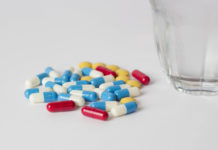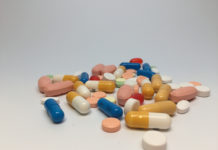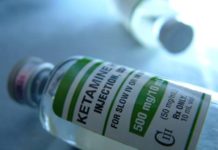Dr. Pies and Dr. Frances Make a Compelling Case that Their Profession is Doing...
Over the past two months, Ronald Pies and Allen Frances, in response to a post I had written, wrote several blogs that were meant to serve as an “evidence-based” defense of the long-term use of antipsychotics. As I read their pieces, I initially focused on that core argument they were presenting, but second time through, the aha moment arrived for me. Their blogs, when carefully parsed, make a compelling case that their profession, in their use of antipsychotics as a treatment for multiple psychotic disorders, has done great harm, and continues to do so today.
New Data Supports Acupuncture as a Treatment for Depression
Researchers found acupuncture effective in the treatment of chronic pain and depression
Antidepressants Linked to Dementia
A study published in this month’s issue of the Journal of Clinical Psychiatry found that the use of antidepressant drugs was associated with an...
Olanzapine Can Cause Serious Skin Reaction, FDA Warns
The US FDA has issued a new warning for the atypical antipsychotic Olanzapine, also known by the brand names Zyprexa and Symbyax. The agency...
Better Outcomes Off Medication for Those Recovered from First-Episode Schizophrenia
A new study has found that of 10 people who were fully recovered from their first episode of schizophrenia (FES), those not taking antipsychotics did better in terms of cognitive, social, and role functioning—and reached full recovery more quickly.
Largest Survey of Antidepressants Finds High Rates of Adverse Emotional and Interpersonal Effects
I thought I would make a small contribution to the discussion about how coverage of the recent airline tragedy focuses so much on the supposed ‘mental illness’ of the pilot and not so much on the possible role of antidepressants. Of course we will never know the answer to these questions but it is important, I think, to combat the simplistic nonsense wheeled out after most such tragedies, the nonsense that says the person had an illness that made them do awful things. So, just to confirm what many recipients of antidepressants, clinicians and researchers have been saying for a long time, here are some findings from our recent New Zealand survey of over 1,800 people taking anti-depressants, which we think is the largest survey to date.
Mental Health Professionals and Patients Often Disagree on Causes of Symptoms
A new study finds that clinicians’ disregard for mental health patients’ insight into their own condition may be detrimental to treatment.
Outcome Reporting Bias in Antipsychotic Medication Trials
A new study in the journal Translational Psychiatry, an influential journal in biological psychiatry published by Nature, challenges the state of the research on antipsychotic drugs.
Psychotropic Medications Serve as Powerful Tools for U.S. Military, Imperialism
Ethnographic research sheds light on extensive psychopharmaceutical use by soldiers in post 9/11 U.S. wars.
How the News Frames the Opioid Epidemic
US news coverage has primarily framed the opioid drug abuse epidemic as a criminal justice issue rather than a public health problem, according to new research published ahead of print in the Journal of Psychiatric Services. The media’s framing of the epidemic may increase stigma against those who develop a dependency on prescription drugs and distract political attention from public-health oriented solutions, such as increased access to substance abuse recovery treatments.
Increased Risk of Movement Disorders From Antipsychotics in Persons with Intellectual Disabilities
Large cohort study demonstrates that those with an intellectual disability are at an increased risk for movement disorder side effects of antipsychotics.
Over 1,000 Antidepressant Users Describe how Their Personal Life has Been Affected
Survey examines adverse personal and interpersonal effects of antidepressants and the impact of polypharmacy
The Dopamine Hypothesis of Schizophrenia – Version III
The Division of Clinical Psychology of the British Psychological Society published a paper titled Understanding Psychosis and Schizophrenia. The central theme of the paper is that the condition known as psychosis is better understood as a response to adverse life events rather than as a symptom of neurological pathology. The paper was wide-ranging and insightful and, predictably, drew support from most of us on this side of the issue and criticism from psychiatry. Section 12 of the paper is headed "Medication" and under the subheading "Key Points" you'll find this quote: "[Antipsychotic] drugs appear to have a general rather than a specific effect: there is little evidence that they are correcting an underlying biochemical abnormality."
Infants Exposed to Psychotropic Drugs During Pregnancy At Risk
New research published in the July issue of The Journal of Clinical Psychiatry found that the use of mood stabilizers, antipsychotics, antidepressants, and hypnotics during pregnancy is associated with increased health risks to the infant.
New Study Examines User Experience of Discontinuing Psychiatric Medications
Researchers find that support and self-care were helpful for users during discontinuation, but that mental health professionals were not very helpful.
FDA Defends Decision to Approve Digital Aripiprazole
Members of the U.S. Food and Drug Administration’s Psychiatry Products division go on the defensive in a new article, responding to concerns about the agency’s approval of digital aripiprazole.
Review Explores First-Person Experiences of People Taking Antipsychotics
A new systematic review finds that patients report reduced symptoms but also loss of self and agency while taking antipsychotics.
Poor Evidence and Substantial Bias in Ritalin Studies
The authors of a large scale well-conducted systematic review of methylphenidate, also known as Ritalin, conclude that there is a lack of quality evidence for the drug’s effectiveness. Their research also revealed that Ritalin can cause sleep problems and decreased appetite in children.
After the Black-Box: Majority of Children Starting SSRIs Still Receiving Too High of Dose
In 2004, the FDA added a black-box warning to SSRI antidepressants on the increased risk of suicide among children taking these drugs. A new study suggests that this warning has increased the proportion of children who begin an antidepressant on a low dose, but the majority are still receiving higher than recommended doses.
Lancet Editorial Points to “Trouble with Psychiatry Trials”
While clinical trials make up the “bedrock of evidence-based medicine” in other specialties, psychiatry faces a number of both ethical and scientific problems related to its use of randomized control trials. According to a new editorial in The Lancet Psychiatry, the field of psychiatry research has particular problems with ethical issues in recruitment, inaccurate classification systems, and controversial placebo comparisons, and then, once the studies are finished, it often remains unclear what the “outcomes actually mean for people’s lives.”
Experts Call on Presidential Candidates to Improve Study Transparency
In an open letter to all US presidential candidates published Thursday in the BMJ, a group of global health care experts assert that current research regulations allow drug companies to publish incomplete and misleading results. They ask the candidates to declare whether they support improved transparency measures that would make data on drug studies publically available and open to scrutiny.
Researchers Find Inadequate Reporting of the Dangers of Ketamine Treatment for Depression
Researchers report that dangerous side effects are not being adequately reported in the trials of ketamine for depression.
Safety Analysis Weighs Harms and Benefits of Antipsychotic Drugs
The researchers find that the drug effects for reducing psychosis are small and that treatment failure and severe side effects are common.
Failed TB Vaccine Exposes Concerns Regarding Research Ethics
An investigation exposes violations to research ethics, finding that researchers failed to disclose risks and even misled government agencies.
Unsafe Use of Sleep Drug Zolpidem is Common
Three out of four users of the sedative, zolpidem (brand name Ambien), do not follow FDA recommendations to reduce risk.






















